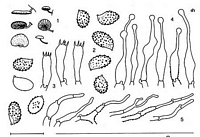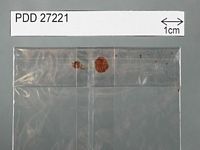|
 Galerina excentrica Galerina excentrica
BiostatusPresent in region - Indigenous. Endemic
Images (click to enlarge)
Caption: Plate 2. 1-5: Galerina excentrica HORAK (PDD 27221, holotype): 1. habit. -2. spores. - 3.
basidia. - 4. cheilocystidia. - 5. pilocystidia. | 
Caption: Dried type specimen
Owner: Herb PDD |
Article: Horak, E. (1988) [1987]. On some extraordinary species of Galerina Earle from New Zealand, Australia and Indonesia, with annotations to related South American taxa. Sydowia 40: 65-80.
Description: Pileus -12 mm, circular becoming hemispherical or conchate, convex when young, expanded
in mature basidiomes, margin slightly incurved; honey brown to date brown; dry,
membranaceous, minutely felty to velutinous, not hygrophanous. - Lamellae (L -10, 1 -3)
adnexed to adnate; at first orange brown turning cinnamon brown or umber brown with
orange tinge, edge albofimbriate. - Stipe -7 x -1 mm, in all stages developed, cylindrical,
eccentric, curved; concolorous with pileus, base covered with conspicuous white tomentum;
dry, pruinose at apex, solid, single. - Veil remnants absent. - Odour and taste not distinctive. -
Chemical reactions on pileus: KOH -negative.
Spore print rust brown. - Spores 5.5-6.5 x 4 µm, ovate, minutely warted, perispore absent,
supraapicular depression and plage present but not distinct, germ pore absent. - Basidia 16-26
x 5-6 µm, 4-spored. - Cheilocystidia 30-65 x 4-7 µm, lecythiform, capitate apex -5 µm
diam., hyaline, towards base often encrusted with brown pigment. - Pleurocystidia none. -
Caulocystidia in shape and size as cheilocystidia. - Pileipellis an irregular cutis composed of
cylindrical to ovoid cells, membranes not gelatinized, but strongly encrusted with brown
pigment (occasionally also with plasmatic pigment), terminal cells cylindrical (or gradually
tapering towards apex), hyaline, -2 µm diam., ± erect. - Clamp connections present.
Habitat: Habitat. - On rotten wood of broad-leaved tree (species unknown). - New Zealand.
Notes: Remarks. - Macroscopically Galerina excentrica is strikingly similar to G. nothofaginea
but differs in its microscopical characters. The most distinguishing feature of G. excentrica
are the slender tibiiform cystidia both on the gill edges and on the surface of the stipe;
remarkably the terminal cells of the pileal hyphae are not lecythiform but cylindrical at the
apical tips. In addition this species is recognized by its small, ovate spores (covered with
rather minute warts) without perispore.
Within the genus Galerina (SMITH & SINGER, 1964) G. excentrica is apparently related to
taxa assembled in the stirps Triscopa (sect. Mycenopsis).
|